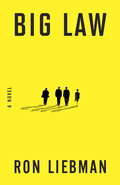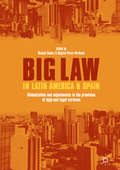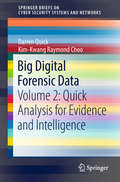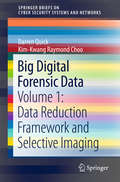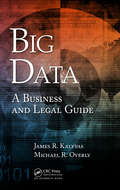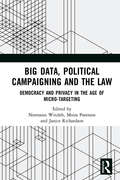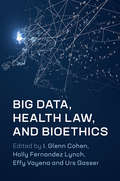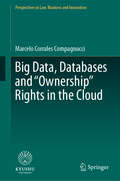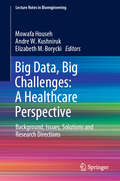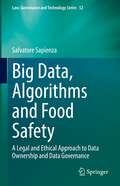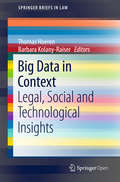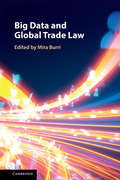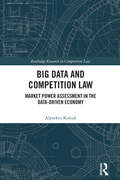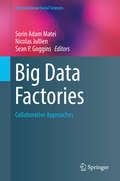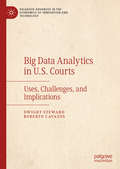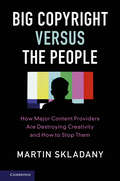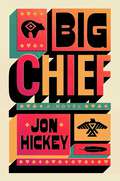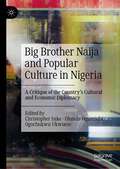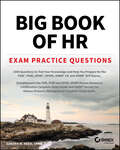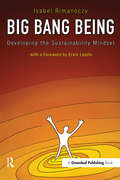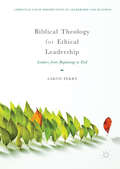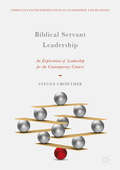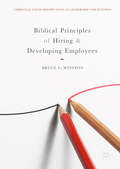- Table View
- List View
Big Law: A Novel
by Ron Liebman“Big Law has it all. A locomotive drive, a fantastic, appealing, big-hearted narrative voice, and an inside and very entertaining look at the intersection of big law and big business. Smart and truly unputdownable.” —John Lescroart As a young partner at Dunn & Sullivan, one of New York's most prestigious law firms, Carney Blake has represented dozens of high-profile clients. But being a pawn of Big Law often means defending the corporate dirt bags of the world—the spillers, the drillers, and the killers. Morality aside, Carney is starting to make a name for himself, despite having a father who resents his success and an unpredictable big brother bent on self-destruction. So when Carney is suddenly asked by his firm's chairman to represent the plaintiffs in a class action lawsuit—and not, as usual, the corporate bad guys—he warily accepts. Maybe they're turning a corner, he thinks. And even if they aren't, when else has a junior partner been assigned such a major case, with a possible billion dollar payout? But Carney can't fool himself for very long. As he digs deeper into the case, he uncovers corruption and maliciously orchestrated schemes that go straight to the top of Dunn & Sullivan—along with the true motives behind his placement on the case. Written by former top litigator Ron Liebman, Big Law is a thrilling, fast-paced roman à clef that exposes the secrecy, deception, and machinations underlining America’s most powerful mega-firms.
Big Law in Latin America and Spain
by Rogelio Pérez-Perdomo Manuel GómezThis book, part of the Stanford Law School research project on the future of the legal profession, thoroughly examines the future of “big law,” defined as the large and mid-size multiservice highly specialized law firms that provide sophisticated, complex and generally costly legal work to multinationals, large and mid-size domestic corporations, and other business clients. By systematically gathering, assessing, and analyzing the best available quantitative and qualitative data on the first tier of the corporate legal services market of Latin America and Spain, and interviewing a broadly representative sample of corporate legal officers, law firm partners, and other stakeholders in each of the countries covered, this book provides a nuanced perspective on changes in “big law” during the last two decades until the present. It also explores the factors that are driving these changes, and the implications for the future of legal profession, legal education and its relationship with the corporate sector and society in general.
Big Digital Forensic Data: Volume 2: Quick Analysis for Evidence and Intelligence (SpringerBriefs on Cyber Security Systems and Networks)
by Kim-Kwang Raymond Choo Darren QuickThis book provides an in-depth understanding of big data challenges to digital forensic investigations, also known as big digital forensic data. It also develops the basis of using data mining in big forensic data analysis, including data reduction, knowledge management, intelligence, and data mining principles to achieve faster analysis in digital forensic investigations. By collecting and assembling a corpus of test data from a range of devices in the real world, it outlines a process of big digital forensic data analysis for evidence and intelligence. It includes the results of experiments on vast volumes of real digital forensic data. The book is a valuable resource for digital forensic practitioners, researchers in big data, cyber threat hunting and intelligence, data mining and other related areas.
Big Digital Forensic Data: Volume 2: Quick Analysis For Evidence And Intelligence (SpringerBriefs On Cyber Security Systems And Networks)
by Kim-Kwang Raymond Choo Darren QuickThis book provides an in-depth understanding of big data challenges to digital forensic investigations, also known as big digital forensic data. It also develops the basis of using data mining in big forensic data analysis, including data reduction, knowledge management, intelligence, and data mining principles to achieve faster analysis in digital forensic investigations. By collecting and assembling a corpus of test data from a range of devices in the real world, it outlines a process of big data reduction, and evidence and intelligence extraction methods. Further, it includes the experimental results on vast volumes of real digital forensic data. The book is a valuable resource for digital forensic practitioners, researchers in big data, cyber threat hunting and intelligence, data mining and other related areas.
Big Data: A Business and Legal Guide
by James R. Kalyvas Michael R. OverlyBig Data: A Business and Legal Guide supplies a clear understanding of the interrelationships between Big Data, the new business insights it reveals, and the laws, regulations, and contracting practices that impact the use of the insights and the data. Providing business executives and lawyers (in-house and in private practice) with an accessible p
Big Data, Political Campaigning and the Law: Democracy and Privacy in the Age of Micro-Targeting
by Normann Witzleb Moira Paterson Janice RichardsonIn this multidisciplinary book, experts from around the globe examine how data-driven political campaigning works, what challenges it poses for personal privacy and democracy, and how emerging practices should be regulated. The rise of big data analytics in the political process has triggered official investigations in many countries around the world, and become the subject of broad and intense debate. Political parties increasingly rely on data analytics to profile the electorate and to target specific voter groups with individualised messages based on their demographic attributes. Political micro-targeting has become a major factor in modern campaigning, because of its potential to influence opinions, to mobilise supporters and to get out votes. The book explores the legal, philosophical and political dimensions of big data analytics in the electoral process. It demonstrates that the unregulated use of big personal data for political purposes not only infringes voters’ privacy rights, but also has the potential to jeopardise the future of the democratic process, and proposes reforms to address the key regulatory and ethical questions arising from the mining, use and storage of massive amounts of voter data. Providing an interdisciplinary assessment of the use and regulation of big data in the political process, this book will appeal to scholars from law, political science, political philosophy and media studies, policy makers and anyone who cares about democracy in the age of data-driven political campaigning.
Big Data, Health Law, and Bioethics
by Holly Fernandez Lynch Urs Gasser I. Glenn Cohen Effy VayenaWhen data from all aspects of our lives can be relevant to our health - from our habits at the grocery store and our Google searches to our FitBit data and our medical records - can we really differentiate between big data and health big data? Will health big data be used for good, such as to improve drug safety, or ill, as in insurance discrimination? Will it disrupt health care (and the health care system) as we know it? Will it be possible to protect our health privacy? What barriers will there be to collecting and utilizing health big data? What role should law play, and what ethical concerns may arise? This timely, groundbreaking volume explores these questions and more from a variety of perspectives, examining how law promotes or discourages the use of big data in the health care sphere, and also what we can learn from other sectors. Focuses deeply on a particular type of big data - that which is health related - but covering a wide variety of issues, including privacy, research, regulation, and more, as well as philosophical and practical considerations. The book is timely, with a unique focus and coverage. In addition to thoughtful academic discussions, chapters contain proposed solutions to existing challenges, which take a variety of approaches, from market-based to regulatory
Big Data, Databases and "Ownership" Rights in the Cloud (Perspectives in Law, Business and Innovation)
by Marcelo Corrales CompagnucciTwo of the most important developments of this new century are the emergence of cloud computing and big data. However, the uncertainties surrounding the failure of cloud service providers to clearly assert ownership rights over data and databases during cloud computing transactions and big data services have been perceived as imposing legal risks and transaction costs. This lack of clear ownership rights is also seen as slowing down the capacity of the Internet market to thrive. Click-through agreements drafted on a take-it-or-leave-it basis govern the current state of the art, and they do not allow much room for negotiation. The novel contribution of this book proffers a new contractual model advocating the extension of the negotiation capabilities of cloud customers, thus enabling an automated and machine-readable framework, orchestrated by a cloud broker.Cloud computing and big data are constantly evolving and transforming into new paradigms where cloud brokers are predicted to play a vital role as innovation intermediaries adding extra value to the entire life cycle. This evolution will alleviate the legal uncertainties in society by means of embedding legal requirements in the user interface and related computer systems or its code. This book situates the theories of law and economics and behavioral law and economics in the context of cloud computing and takes database rights and ownership rights of data as prime examples to represent the problem of collecting, outsourcing, and sharing data and databases on a global scale. It does this by highlighting the legal constraints concerning ownership rights of data and databases and proposes finding a solution outside the boundaries and limitations of the law. By allowing cloud brokers to establish themselves in the market as entities coordinating and actively engaging in the negotiation of service-level agreements (SLAs), individual customers as well as small and medium-sized enterprises could efficiently and effortlessly choose a cloud provider that best suits their needs. This approach, which the author calls “plan-like architectures,” endeavors to create a more trustworthy cloud computing environment and to yield radical new results for the development of the cloud computing and big data markets.
Big Data, Big Challenges: Background, Issues, Solutions and Research Directions (Lecture Notes in Bioengineering)
by Mowafa Househ Andre W. Kushniruk Elizabeth M. BoryckiThis is the first book to offer a comprehensive yet concise overview of the challenges and opportunities presented by the use of big data in healthcare. The respective chapters address a range of aspects: from health management to patient safety; from the human factor perspective to ethical and economic considerations, and many more. By providing a historical background on the use of big data, and critically analyzing current approaches together with issues and challenges related to their applications, the book not only sheds light on the problems entailed by big data, but also paves the way for possible solutions and future research directions. Accordingly, it offers an insightful reference guide for health information technology professionals, healthcare managers, healthcare practitioners, and patients alike, aiding them in their decision-making processes; and for students and researchers whose work involves data science-related research issues in healthcare.
Big Data, Algorithms and Food Safety: A Legal and Ethical Approach to Data Ownership and Data Governance (Law, Governance and Technology Series #52)
by Salvatore SapienzaThis book identifies the principles that should be applied when processing Big Data in the context of food safety risk assessments. Food safety is a critical goal in the protection of individuals’ right to health and the flourishing of the food and feed market. Big Data is fostering new applications capable of enhancing the accuracy of food safety risk assessments. An extraordinary amount of information is analysed to detect the existence or predict the likelihood of future risks, also by means of machine learning algorithms. Big Data and novel analysis techniques are topics of growing interest for food safety agencies, including the European Food Safety Authority (EFSA). This wealth of information brings with it both opportunities and risks concerning the extraction of meaningful inferences from data. However, conflicting interests and tensions among the parties involved are hindering efforts to find shared methods for steering the processing of Big Data in a sound, transparent and trustworthy way. While consumers call for more transparency, food business operators tend to be reluctant to share informational assets. This has resulted in a considerable lack of trust in the EU food safety system. A recent legislative reform, supported by new legal cases, aims to restore confidence in the risk analysis system by reshaping the meaning of data ownership in this domain. While this regulatory approach is being established, breakthrough analytics techniques are encouraging thinking about the next steps in managing food safety data in the age of machine learning.The book focuses on two core topics – data ownership and data governance – by evaluating how the regulatory framework addresses the challenges raised by Big Data and its analysis in an applied, significant, and overlooked domain. To do so, it adopts an interdisciplinary approach that considers both the technological advances and the policy tools adopted in the European Union, while also assuming an ethical perspective when exploring potential solutions. The conclusion puts forward a proposal: an ethical blueprint for identifying the principles – Security, Accountability, Fairness, Explainability, Transparency and Privacy – to be observed when processing Big Data for food safety purposes, including by means of machine learning. Possible implementations are then discussed, also in connection with two recent legislative proposals, namely the Data Governance Act and the Artificial Intelligence Act.
Big Data in Context: Legal, Social and Technological Insights (SpringerBriefs in Law)
by Thomas Hoeren Barbara Kolany-RaiserThis book is open access under a CC BY 4. 0 license. This book sheds new light on a selection of big data scenarios from an interdisciplinary perspective. It features legal, sociological and economic approaches to fundamental big data topics such as privacy, data quality and the ECJ's Safe Harbor decision on the one hand, and practical applications such as smart cars, wearables and web tracking on the other. Addressing the interests of researchers and practitioners alike, it provides a comprehensive overview of and introduction to the emerging challenges regarding big data. All contributions are based on papers submitted in connection with ABIDA (Assessing Big Data), an interdisciplinary research project exploring the societal aspects of big data and funded by the German Federal Ministry of Education and Research. This volume was produced as a part of the ABIDA project (Assessing Big Data, 01IS15016A-F). ABIDA is a four-year collaborative project funded by the Federal Ministry of Education and Research. However the views and opinions expressed in this book reflect only the authors' point of view and not necessarily those of all members of the ABIDA project or the Federal Ministry of Education and Research.
Big Data and Global Trade Law
by Mira BurriThis collection explores the relevance of global trade law for data, big data and cross-border data flows. Contributing authors from different disciplines including law, economics and political science analyze developments at the World Trade Organization and in preferential trade venues by asking what future-oriented models for data governance are available and viable in the area of trade law and policy. The collection paints the broad picture of the interaction between digital technologies and trade regulation as well as provides in-depth analyses of critical to the data-driven economy issues, such as privacy and AI, and different countries' perspectives. This title is also available as Open Access on Cambridge Core.
Big Data and Competition Law: Market Power Assessment in the Data-Driven Economy (Routledge Research in Competition Law)
by Alptekin KoksalRecent studies on competition law and digital markets reveal that accumulating personal information through data collection and acquisition methods benefits consumers considerably. Free of charge, fast and personalised services and products are offered to consumers online. Collected data is now an indispensable part of online businesses to the point that a new economy, a data-driven sector, has emerged. Many markets such as the social network, search engine, online advertising and e-commerce are regarded as data-driven markets in which the utilisation of Big Data is a requisite for the success of operations. However, the accumulation and use of data brings competition law concerns as they contribute to market power in the online world, resulting in a few technology giants gaining unprecedented market power due to the Big Data accumulation, indirect network effects and the creation of online ecosystems. As technology giants have billions of consumers worldwide, data-driven markets are truly global. In these data-driven markets, technology giants abuse their dominant positions, but existing competition law tools seem ineffective in addressing market power and assessing abusive behaviour related to Big Data. This book argues that a novel approach to the data-driven sector must be developed through the application of competition law rules to address this. It argues that current and potential conflicts can be mitigated by extending the competition law assessment beyond the current competition law tools to offer a modernised and unified approach to the Big Data–related competition issues. Promoting new legal tests for addressing the market power of technology giants and assessing abusive behaviour in data-driven markets, this book advocates for cooperation between competition and data protection authorities. It will be of interest to students, academics and practitioners with an interest in competition law and data protection.
Big Data Factories: Collaborative Approaches (Computational Social Sciences)
by Sean P. Goggins Sorin Adam Matei Nicolas JullienThe book proposes a systematic approach to big data collection, documentation and development of analytic procedures that foster collaboration on a large scale. This approach, designated as "data factoring" emphasizes the need to think of each individual dataset developed by an individual project as part of a broader data ecosystem, easily accessible and exploitable by parties not directly involved with data collection and documentation. Furthermore, data factoring uses and encourages pre-analytic operations that add value to big data sets, especially recombining and repurposing. The book proposes a research-development agenda that can undergird an ideal data factory approach. Several programmatic chapters discuss specialized issues involved in data factoring (documentation, meta-data specification, building flexible, yet comprehensive data ontologies, usability issues involved in collaborative tools, etc. ). The book also presents case studies for data factoring and processing that can lead to building better scientific collaboration and data sharing strategies and tools. Finally, the book presents the teaching utility of data factoring and the ethical and privacy concerns related to it. Chapter 9 of this book is available open access under a CC BY 4. 0 license at link. springer. com
Big Data Analytics in U.S. Courts: Uses, Challenges, and Implications (Palgrave Advances in the Economics of Innovation and Technology)
by Dwight Steward Roberto CavazosThis Palgrave Pivot identifies the key legal, economic, and policy issues surrounding the allowance to use and interpret electronic data consistently and in a scientifically valid manner in U.S. courts. Evidence based on the analysis of large amounts of electronic data ("Big Data") plays an increasing role in civil court disputes, providing information that could not have been obtained from a witness stand. While Big Data evidence presents opportunities, it also presents legal and public policy challenges and concerns. How can one be sure that deviations found in Big Data fall outside the norm? If statistical analyses can be conducted and presented different ways, how can judges and juries make sense of conflicting interpretations? When does Big Data extraction stop being investigative and instead become an invasion of privacy? This book traces the history of Big Data use in U.S. courts, couples current case studies with legal challenges to explore key controversies, and suggests how courts can change the way they handle Big Data to ensure that findings are statistically significant and scientifically sound.
Big Crime and Big Policing: All about Big Money?
by Stephen Schneider Tonita Murray Elizabeth KirleyFollowing money over national borders, banking systems, casinos, and free trade zones, as well as the world of the corrupt elites, Big Crime and Big Policing brings new scholarly and practical insights into our understanding of the interplay of money, crime, and policing on the grand scale. In this wide-ranging volume, a mixed group of scholars and practitioners aim to show how money dictates the scope and nature of financial and corporate crimes, and the impact of these crimes on national economies, social institutions, and communal well-being alike. The book examines how the combined efforts of governments and international organizations fail to stop financial crime at its source and, despite apparently generous human and financial resources, police and law enforcement efforts ultimately fall short of defeating big crime and of meeting public safety needs. International in scope, Big Crime and Big Policing provides fresh reflection on a significant problem of our age, one that demands greater attention from governments and the public.
Big Copyright Versus the People: How Major Content Providers Are Destroying Creativity and How to Stop Them
by Martin SkladanyWhen the idea of copyright was enshrined in the Constitution it was intended to induce citizens to create. Today, however, copyright has morphed into a system that offers the bulk of its protection to a select number of major corporate content providers (or Big Copyright), which has turned us from a country of creators into one of consumers who spend, on average, ten hours each day on entertainment. In this alarming but illuminating book, Martin Skladany examines our culture of overconsumption and shows not only how it leads to addiction, but also how it is unraveling important threads - of family, friendship, and community - in our society. Big Copyright versus the People should be read by anyone interested in understanding how Big Copyright managed to get such a lethal grip on our culture and what can be done to loosen it.
Big Chief
by Jon HickeyMitch Caddo started out with the best of intentions—after his mother&’s sudden death in a car crash, he finished law school and returned to Passage Rouge, the reservation where she grew up. Though an outsider to the tribe himself, he sought to help his new community by representing disadvantaged families in tribal court. But that was before--before he got sucked into the world of Mack Plum, his charismatic childhood friend. Before Mack ran and won the race for Tribal President as an underdog populist. Before he and Mitch became the people who would do anything to keep Mack at the head of the tribal council. And before he came face to face once again with his teenage flame Layla Plum, none other than Mack&’s sister, who had returned to Passage Rouge for her own reasons. Now on the eve of Passage Rouge&’s next tribal election, Mitch finds himself torn between two rivals: he&’s unsettled by Mack&’s abuses of power and his own complicity in them, but he doesn&’t quite trust Gloria Hawkins, Mack&’s opponent--a nationally known activist and politician who has Layla running her campaign. When an accident claims the life of a central figure in the reservation&’s complicated political landscape, the election descends into chaos, and Mitch and Layla find themselves trying to stop the tribe&’s slide towards all-out violence while doing their best to correct the wrongs of the past. Big Chief tells a story about the search for belonging, not just as an individual, but as a sovereign people at a moment of great historical importance.
Big Business and Presidential Power: From FDR to Reagan
by Kim McquaidTHIS IS A BOOK about patterns of interaction between big businessmen and the federal government during the past half century. It was written on the assumption that the primary responsibility of the historian is to tell a good story about what happened and why it happened, in as brief a fashion as possible. The work, therefore, is comparatively free of technical jargon. As information regarding high-level interaction between corporate and governmental leaders is often extremely hard to come by, notes have been included to direct particularly interested readers to the relevant source materials.
Big Brother Naija and Popular Culture in Nigeria: A Critique of the Country's Cultural and Economic Diplomacy
by Christopher Isike Olusola Ogunnubi Ogochukwu UkwuezeThis book is about Big Brother Naija (BBN), which is a Nigerian version of the Big Brother franchise featured in more than 50 countries of the world with its major concept drawn from George Orwell ’s novel, Nineteen Eigther-Four . It is organised and starred by Nigerians but viewed in many parts of the world. The book critically engages this relatively new phenomenon in Nigeria which apparently lacks scholarly attention. It proffers insights into the show’s significance and implications for the nation with relation to mental health, morality, cultural di
Big Book of HR Exam Practice Questions: 1000 Questions to Test Your Knowledge and Help You Prepare for the PHR, PHRi, SPHR, SPHRi and SHRM CP/SCP Certification Exams
by Sandra M. ReedPrepare for HR certification exams faster and smarter with over 1000 expertly written practice questions In the Big Book of HR Exam Practice Questions: 1000 Questions to Test Your Knowledge and Help You Prepare for the PHR, PHRi, SPHR, SPHRi and SHRM CP/SCP Certification Exams, human resources certification expert Sandra M. Reed delivers an essential test-prep resource for the Human Resources Certification Institute's PHR, PHRi, SPHR, SPHRi and SHRM CP and SCP exams. The book offers over 1000 challenging and well-written questions covering the entire range of subjects covered by the tests, updated for the 2024 exams. In the book, you'll find content exploring United States labor law, talent planning and acquisition, business strategy, total rewards, learning and development, risk management and compliance, diversity, equity, and inclusion, and much more. You'll also discover: Easy-to-find info that makes the book perfect as a go-to, on-the-job resource for practicing HR professionals Extensive materials offering full coverage of the subjects tested on the exams, helping you to reduce test anxiety and improve information recall Online recommendations for additional expert resources that will take your study efforts to the next level Complimentary access to Sybex's easy-to-use online test bank that includes all the practice questions from the book An effective and powerful study resource for people preparing for the HRCI's PHR, SPHR, and SHRM CP and SCP exams, Big Book of HR Exam Practice Questions is also the perfect desk reference for aspiring and practicing human resource practitioners.
Big Bang Being: Developing the Sustainability Mindset
by Ervin Laszlo Isabel RimanoczyWhen asked for the definition of mental health and fulfilment, Sigmund Freud had two words: lieben und arbeiten, love and work. In this book we will find how 16 business leaders brought together their compassion, their caring for others and the world, with their work.True, only on rare occasions are we able to meet the person behind initiatives that made a positive impact on the world, even less have an in-depth view into their feelings, concerns, hesitations, doubts and most intimate thoughts. What is seen publicly is the initiative, the impact on the bottom line and the community, or sometimes on the environment. Yet it is their _personal_ stories that can be most inspirational, since they draw our attention to the fact that amazing achievements start in simple ways, with just the thinking of one individual. And when we find out that the "exemplary individuals" have many very "human" aspects that we identify with and find in ourselves, it brings us closer; and, particularly, it may even trigger in us the question: If she could do it... I wonder what could _I_ do?The interviews, however, were only the beginning of the journey. The lessons of the interviews made it possible to identify how we can all develop a sustainability mindset: in other words, the thinking and the being that can take us from breakdown to breakthrough on this planet. Each one of us can play a part in leading the change; in fact, we are already playing a part – we are just not necessarily aware if that is the part we would like to play, or aware that we choose the change we are contributing to unfold.Part I presents the 16 leaders, including a summary of their story and their initiatives. Part II goes a little deeper, as you will find two dimensions that were not obvious but which underlie the way these business leaders championed the initiatives: the Thinking and the Being. Part III explores why sustainability change is so slow, and addresses the "elephant in the room": the values and beliefs that anchor our Western Weltanschauung, or worldview. Part IV addresses the alternatives that we have to convert the unsustainable values into opportunities that will permit humanity to thrive and to break through the obstructions that prevent us from stasis. Finally, Part V takes us beyond the tipping point, and presents us with an opportunity to evolve as humans developing a new way of thinking and being on this planet. This transformation is so radical and significant, that the author calls it the Big Bang Being.
Biblical Theology for Ethical Leadership: Leaders From Beginning To End (Christian Faith Perspectives In Leadership And Business Ser.)
by Aaron PerryThis book argues that ethical leadership without a theological foundation is lacking a firm foundation. It begins with a critical assessment of ethical leadership as a leadership theory, showing how ethics and theology became separated, creating the space for ethical leadership outside of theology. Nevertheless, the author argues that ethical leadership without a biblical basis is weak, though one need not be religious to embrace the leadership principles of biblical theology. Unfolding Christology, anthropology, eschatology, and contextualized leadership as four key aspects of biblical theology for ethical leadership, this book will appeal to those studying leadership, business, innovation, and entrepreneurship.
Biblical Servant Leadership: An Exploration of Leadership for the Contemporary Context (Christian Faith Perspectives in Leadership and Business)
by Steven CrowtherThis book explores the concepts from Scripture for Servant leadership and compare these findings with contemporary models of servant leadership. It is an examination of Christian leadership for the contemporary world in its global and increasing secular context. Leadership studies typically view leadership externally from the results. This is a good beginning but leadership needs to also view the inside of leadership in the person of the leader. Scripture is uniquely qualified in this area since its first concern is the person who leads not just in leadership behaviors. The author uses examples from both the Old and New Testament to establish a new shepherd model of leadership that moves beyond the servant mode to the mode of caring direction. This model will provide scholars and researchers as well as leaders themselves with a way of leading that overcomes negative forms of leadership which lead to failure.
Biblical Principles of Hiring and Developing Employees (Christian Faith Perspectives In Leadership And Business Ser.)
by Bruce E. WinstonThis book begins with the scriptural support for person-organization fit and person-job fit. The book then examines scriptural support for the four-Cs of people’s work-fit: Calling, Competence, Confidence, and Character. Finally, the book uses Acts 6:1-7 as a basis for identifying the type of people one should look to hire. The book covers two development concepts: Nomos, about ruling in an organization, and progressive responsibility from Luke 16:10. The chapters present the concepts from a scriptural base and include composite case examples that relate to contemporary organizations.
